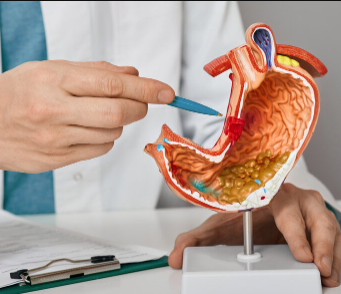BOURSESSENEGAL – When it comes to digestive health, a gastroenterologist plays a vital role in diagnosing and treating conditions affecting the gastrointestinal (GI) tract. Whether you’re dealing with persistent stomach pain, unusual digestive symptoms, or conditions like irritable bowel syndrome (IBS), knowing when to consult a gastroenterologist can significantly impact your health. This guide will help you understand what a gastroenterologist does, common conditions they treat, and how to prepare for your visit.
What is a Gastroenterologist?
A gastroenterologist is a medical doctor specializing in the diagnosis and treatment of diseases related to the digestive system. This includes the esophagus, stomach, intestines, liver, gallbladder, and pancreas. These specialists undergo extensive training, completing medical school and a residency in internal medicine, followed by a fellowship in gastroenterology.
Why See a Gastroenterologist?
You might wonder why it’s essential to see a gastroenterologist instead of a general practitioner. While primary care doctors can manage many health issues, gastroenterologists possess specialized knowledge and tools to tackle complex digestive disorders. If you experience any persistent symptoms related to your digestive health, seeking a gastroenterologist’s expertise can lead to more accurate diagnoses and effective treatment plans.
Common Conditions Treated by Gastroenterologists
Gastroenterologists address a wide range of conditions affecting the digestive system. Here are some of the most common:
1. Acid Reflux and GERD
Acid reflux occurs when stomach acid flows back into the esophagus, causing heartburn and discomfort. Gastroenterologists can diagnose gastroesophageal reflux disease (GERD) and recommend lifestyle changes, medications, or surgical options to manage symptoms effectively.
2. Inflammatory Bowel Disease (IBD)
Conditions like Crohn’s disease and ulcerative colitis fall under IBD. These chronic diseases cause inflammation in the GI tract, leading to symptoms such as abdominal pain, diarrhea, and fatigue. A gastroenterologist can provide treatments that help control inflammation and improve quality of life.
3. Irritable Bowel Syndrome (IBS)
IBS affects many individuals and can cause abdominal pain, bloating, and changes in bowel habits. Gastroenterologists use various approaches to manage IBS, including dietary changes, medications, and stress management techniques.
4. Celiac Disease
Celiac disease is an autoimmune disorder where ingestion of gluten leads to damage in the small intestine. A gastroenterologist can perform tests to diagnose celiac disease and guide patients toward a gluten-free diet for symptom relief.
5. Liver Disorders
Conditions like fatty liver disease, hepatitis, and cirrhosis can impact liver function. Gastroenterologists monitor liver health, conduct necessary tests, and develop treatment plans tailored to individual needs.
Diagnostic Procedures Performed by Gastroenterologists
To accurately diagnose digestive conditions, gastroenterologists utilize a variety of diagnostic procedures. Understanding these can help ease any concerns you might have about visiting one.
1. Endoscopy
An endoscopy involves inserting a flexible tube with a camera through the mouth or rectum to visualize the GI tract. This procedure helps gastroenterologists examine areas such as the esophagus, stomach, and intestines for abnormalities.
2. Colonoscopy
A colonoscopy is a specific type of endoscopy that focuses on the large intestine. Gastroenterologists recommend this procedure for screening colon cancer, assessing inflammatory bowel diseases, and investigating unexplained gastrointestinal symptoms.
3. Imaging Tests
Gastroenterologists may also order imaging tests like ultrasounds, CT scans, or MRIs to gain insights into the abdominal organs. These tests help identify structural issues that might contribute to digestive problems.
4. Laboratory Tests
Blood tests and stool samples provide valuable information about digestive health. They can help detect infections, inflammation, and other abnormalities that require further investigation.
How to Prepare for Your Gastroenterology Appointment
Preparing for your visit to a gastroenterologist can make the process smoother. Here are some steps to consider:
1. Document Your Symptoms
Before your appointment, keep a record of your symptoms. Note when they occur, their intensity, and any triggers. This information will help your gastroenterologist understand your condition better.
2. Review Your Medical History
Be ready to discuss your medical history, including any previous digestive issues, surgeries, or treatments. This context is crucial for your gastroenterologist in making accurate diagnoses.
3. Prepare Questions
Prepare a list of questions you want to ask during your visit. This could include inquiries about your symptoms, recommended tests, and treatment options. Don’t hesitate to seek clarification on any points.
4. Follow Pre-Appointment Instructions
If your gastroenterologist requires you to undergo specific tests or procedures, follow their instructions carefully. This may involve dietary restrictions or medications to take or avoid before your appointment.
Treatment Options Offered by Gastroenterologists
Once your gastroenterologist diagnoses your condition, they will discuss potential treatment options. These may include:
1. Lifestyle Modifications
For many digestive issues, lifestyle changes can be highly effective. This could involve dietary adjustments, increased physical activity, and stress management techniques.
2. Medications
Gastroenterologists often prescribe medications to alleviate symptoms or manage underlying conditions. This could include antacids for acid reflux, anti-inflammatory drugs for IBD, or antibiotics for infections.
3. Nutritional Counseling
For conditions like celiac disease or food intolerances, dietary changes are crucial. Gastroenterologists may work with nutritionists to develop meal plans tailored to your needs.
4. Surgical Interventions
In some cases, surgery might be necessary to address severe digestive issues. Gastroenterologists can evaluate whether surgical options are appropriate for your condition.
The Importance of Regular Check-Ups
For individuals with chronic digestive conditions, regular check-ups with a gastroenterologist are essential. Ongoing monitoring allows for timely adjustments to treatment plans and ensures optimal health. These visits also provide opportunities to discuss any new symptoms or concerns.
Conclusion: Prioritizing Your Digestive Health
A gastroenterologist is an invaluable ally in managing your digestive health. By understanding their role, the conditions they treat, and the diagnostic procedures they perform, you can take proactive steps toward better health. If you experience persistent digestive issues, don’t hesitate to seek a gastroenterologist’s expertise. Early intervention can lead to more effective treatments and improved quality of life.
Remember, your digestive health matters. Taking the time to consult with a specialist can pave the way for a healthier future. Embrace the journey to understanding your body, and take charge of your digestive wellness today!
REFERENCE : https://www.health.com/



